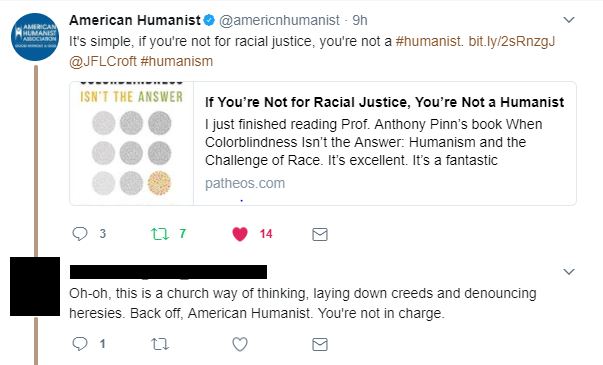You Keep Using That Word…

“Systemic and institutional bias and privilege are, in my opinion, the current greatest threats to human progress…the betterment of the people around me and my desire to see more clearly the bias and privilege that occurs, both for myself and in the world, is what makes me a humanist.”
– Adam Savage, 2017 Humanist of the Year
Humanism emphasizes the equal value and agency of all human beings.
It’s easy to get those who identify as humanists to agree with the truth and import of this philosophical statement. The gargantuan undertaking seems to be connecting this theoretical lifestance with lived attitudes, beliefs, and practices.
Dr. James Croft, humanist writer, activist, and outreach director of the Ethical Society of St. Louis, recently reviewed Anthony Pinn’s When Colorblindness Isn’t The Answer. In it, he noted:
If you’re not for racial justice you are not a humanist. If you are not for an end to white supremacy, you are not a humanist. If you are not for the liberation of all people from all structures of oppression, you are not a humanist.
Given my opening statement regarding humanist principles, what Croft said should not only be uncontroversial, it should be a foregone humanist conclusion. However, just as I’ve previously addressed matters of race, racism, and white supremacy and received pushback, there are those who proclaim to be humanists that will read Croft’s words and will ideologically recoil. Croft rightly anticipated there would be detractors who consider this position dogmatic or exclusionary. To this interpretation he answered:
Humanism is the name for a set of values grounded on the idea that every person has the inalienable right to live a life in which they have the opportunity to flourish and enjoy full dignity. Racial justice and an end to white supremacy is an inherent part of that program—it simply cannot be excised.
The American Humanist Association shared Croft’s review, as we are committed to working towards a more inclusive, cruelty-free world.

Croft followed up his review with a blog post responding to criticisms regarding his statements about racial justice and oppression. He points out something that’s always seemed too obvious for me to write:
For humanism to have any meaning at all it has to have some boundaries, some limits. If “humanism” can mean anything at all—if nothing is excluded from the definition—then the term means nothing.
This isn’t difficult to comprehend. When discussing the relationship between humanism and social justice, it’s done from an understanding that humanist philosophy articulates an implicit as well as unambiguous agreement with, and promotion of, an anti-oppressive enterprise. Croft parses this matter by succinctly referring to past and more modern humanist works that are widely accepted, including the Humanist Manifestos.
It isn’t dogmatic to point out, as Croft did, that anti-racism is an essential component to humanism. And by “anti-racism,” I’m referring to use of critical thinking to detect and confront values, attitudes, structures, policies, practices, and behaviors that perpetuate racial injustice—what Adam Savage referred to as “systemic and institutional bias and privilege.”
Anti-racism is both a framework and an active response to racism. Racism is a form of social oppression that occurs at all levels and spheres of society. Social oppression is rooted in hierarchical social structures defining one or more groups as being inferior to others. This idea of inferiority is premised on delegitimizing the humanity of an individual, group, or groups to justify rendering a higher regard for the humanity of those belonging to the dominant social group.
This brings us back to the beginning: Humanism emphasizes the equal value and agency of all human beings.
I won’t go so far as to say that those who navigate the world in a way that denies the intrinsic link between anti-racism and humanist praxis are not humanists. However, those who self-identify as humanists while simultaneously denying the importance of anti-oppressive, humanity-affirming goals remind me of a fairly famous movie quote…

If the set of values humanists observe doesn’t embrace racial justice, what does that say about them? What does that say about their idea of humanism?
